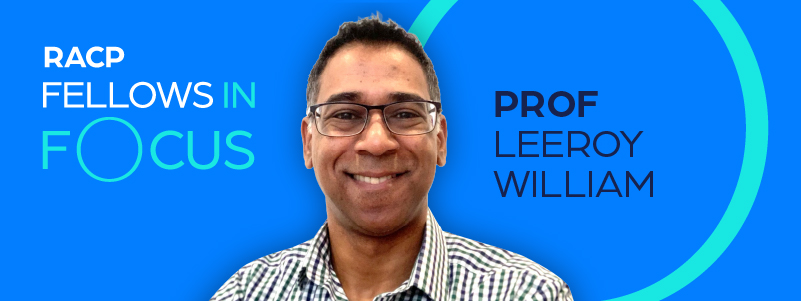RACP Fellows in Focus: Professor Leeroy William
Date published:
04 Apr 2022

“Physical, psychological, social and existential issues that people have – that's what holistic care is all about,” Professor Leeroy William began, as he described his emphasis for becoming a specialist on Australian soil.
“I always had good interactions with the palliative care team in terms of managing symptoms, but there was a turning point for me to think about that as a career.”
The turning point Leeroy mentioned was while doing a radiation oncology rotation in Poole in the United Kingdom. A friend was training in palliative medicine and we were looking after people who were having radiotherapy for their brain tumours. “I had a patient who wanted to go to his daughter's wedding. The palliative care nurse asked me, “Did you realise that this was happening?” I did not. “We need to sort out his medication, so he can walk his daughter down the aisle.” At that moment I realised I was completely oblivious to the information about that patient. That really made me think, perhaps you're not as holistic as you think you are.”
Today, Leeroy is the Clinical Director of the Supportive & Palliative Care service at Eastern Health, with academic positions at Monash and La Trobe Universities in Victoria. Furthermore, he’s the current President of the Australian and New Zealand Society of Palliative Medicine. When it comes to palliative care in Australia, he knows a thing or two about its importance in the medical mix. It is an area of care fraught with so many considerations and for those with burning questions about the field, Leeroy explains, “It’s all about perspective. In medicine, some have a perspective that they want to make people better. To cure people. Of course, if you know that all people in your care are going to die, then your perspective is different. My perspective is to make the time for that person or their family, the best it can possibly be. I see it's my role to try and enable them to do as much as possible. Sometimes people get on the conveyor belt of healthcare and it's very difficult for them to get off. No one has necessarily asked them what they want and what’s important to them. Having a meaningful conversation that guides what we should be doing, rather than what we can do is important. We can always keep on with treatment to cure, but there needs to be a point when where we're doing what's right for patients who can’t be cured. I see it as a perspective of doing the best for that person in the time they have left.”
The challenges of the profession come thick and fast, and Leeroy must, “embrace the uncertainty of what can and can't be achieved.” Palliative care is about a special kind of teamwork, one which Leeroy refers to as an “inter-professional multidisciplinary approach to care.”
“You never take on the burden. You're always sharing the load with other people in the team. It means that we do what healthcare should do. Work together in teams, collaborate, avoid silos and provide holistic care.”
Leeroy described how the skills necessary to be successful are plentiful. “Communication, being curious about the person, trying to understand why people make certain decisions, the experiences that inform those decisions, the ups and downs in their life and how they've coped with things.” It is these things, he told us, that “teach us how to live our lives.”
“We always marvel at the resilience of our patients and their families to overcome hurdles in their life. That's not just from a physical illness, but the other things too. I think the ability to have those conversations and be open and honest with people is imperative. Plus, a good sense of humour helps.”
For those looking to follow in the illustrious footsteps of Leeroy, he had some pertinent advice for the future Fellows of the College, “Try and get some experience in palliative care units or working with palliative care teams to test the waters. There's a great combination of so many areas - psychology, humanities, medicine, ethical issues, sociology, philosophy and anthropology, to name a few. All these things are mixed together in what we do because of the nature of end of life care. Ultimately you don’t know what it's like to dive into, but you really have to be curious about people.”